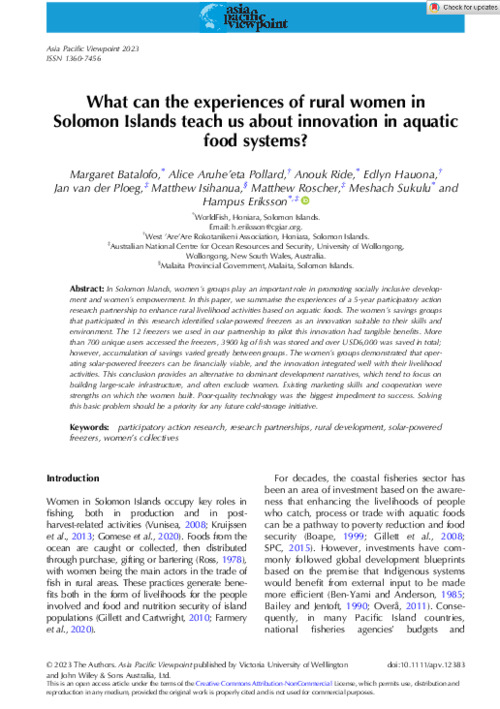Please use this identifier to cite or link to this item:
https://hdl.handle.net/20.500.12348/5605
What can the experiences of rural women in Solomon Islands teach us about innovation in aquatic food systems?
| dc.creator | Batalofo, M. | en_US |
| dc.creator | Pollard, A.A. | en_US |
| dc.creator | Ride, A. | en_US |
| dc.creator | Hauona, E. | en_US |
| dc.creator | Van Der Ploeg, J. | en_US |
| dc.creator | Isihanua, M. | en_US |
| dc.creator | Roscher, M.B. | en_US |
| dc.creator | Sukulu, M. | en_US |
| dc.creator | Eriksson, H. | en_US |
| dc.date.accessioned | 2023-08-17T21:11:15Z | |
| dc.date.available | 2023-08-17T21:11:15Z | |
| dc.date.issued | 2023 | en_US |
| dc.identifier.citation | Margaret Batalofo, Alice Pollard, Anouk Ride, Edlyn Hauona, Jan Van Der Ploeg, Mathew Isihanua, Matthew Roscher, Meshach Sukulu, Hampus Eriksson. (30/7/2023). What can the experiences of rural women in Solomon Islands teach us about innovation in aquatic food systems. Asia Pacific Viewpoint. | en_US |
| dc.identifier.issn | 1360-7456 | en_US |
| dc.identifier.issn | 1467-8373 | en_US |
| dc.identifier.uri | https://hdl.handle.net/20.500.12348/5605 | |
| dc.description.abstract | In Solomon Islands, women's groups play an important role in promoting socially inclusive development and women's empowerment. In this paper, we summarise the experiences of a 5-year participatory action research partnership to enhance rural livelihood activities based on aquatic foods. The women's savings groups that participated in this research identified solar-powered freezers as an innovation suitable to their skills and environment. The 12 freezers we used in our partnership to pilot this innovation had tangible benefits. More than 700 unique users accessed the freezers, 3900 kg of fish was stored and over USD6,000 was saved in total; however, accumulation of savings varied greatly between groups. The women's groups demonstrated that operating solar-powered freezers can be financially viable, and the innovation integrated well with their livelihood activities. This conclusion provides an alternative to dominant development narratives, which tend to focus on building large-scale infrastructure, and often exclude women. Existing marketing skills and cooperation were strengths on which the women built. Poor-quality technology was the biggest impediment to success. Solving this basic problem should be a priority for any future cold-storage initiative. | en_US |
| dc.format | en_US | |
| dc.language | en | en_US |
| dc.publisher | Wiley | en_US |
| dc.rights | CC-BY-NC-4.0 | en_US |
| dc.source | Asia Pacific Viewpoint;(2023) | en_US |
| dc.subject | research partnerships | en_US |
| dc.subject | solar-powered freezers | en_US |
| dc.subject | women’s collectives | en_US |
| dc.title | What can the experiences of rural women in Solomon Islands teach us about innovation in aquatic food systems? | en_US |
| dc.type | Journal Article | en_US |
| cg.contributor.funder | Australian Center for International Agricultural Research | en_US |
| cg.contributor.funder | Stockholm University, Stockholm Resilience Centre, SwedBio | en_US |
| cg.contributor.project | Innovating fish-based livelihoods in the community economies of Timor-Leste and Solomon Islands (FIS-2019-124) | en_US |
| cg.coverage.country | Solomon Islands | en_US |
| cg.coverage.region | Melanesia | en_US |
| cg.subject.agrovoc | rural development | en_US |
| cg.subject.agrovoc | participatory action research | en_US |
| cg.subject.agrovoc | Fish | en_US |
| cg.contributor.affiliation | WorldFish | en_US |
| cg.contributor.affiliation | Ministry of Fisheries and Marine Resources | en_US |
| cg.contributor.affiliation | Malaita Provincial Government | en_US |
| cg.contributor.affiliation | Australian National Center for Ocean Resources & Security | en_US |
| cg.contributor.affiliation | West ‘Are’Are Rokotanikeni Association | en_US |
| cg.identifier.status | Open access | en_US |
| cg.identifier.ISIindexed | ISI indexed | en_US |
| cg.contribution.worldfishauthor | Batalofo, M. | en_US |
| cg.contribution.worldfishauthor | Ride, A. | en_US |
| cg.contribution.worldfishauthor | Sukulu, M. | en_US |
| cg.contribution.worldfishauthor | Eriksson, H. | en_US |
| cg.description.theme | Resilient small-scale fisheries | en_US |
| cg.description.theme | Gender | en_US |
| dc.identifier.doi | https://dx.doi.org/10.1111/apv.12383 | en_US |
| cg.creator.id | Matthew B Roscher: 0000-0002-3408-8763 | en_US |
| cg.creator.id | Hampus Eriksson: 0000-0003-1199-6889 | en_US |
Files in this item
This item appears in the following Collection(s)
-
Gender [323]
-
Resilient small-scale fisheries [1337]
